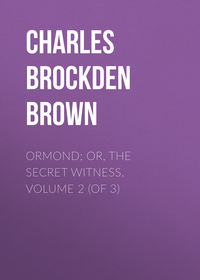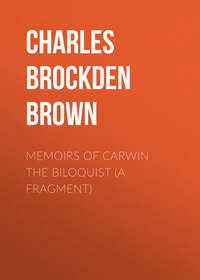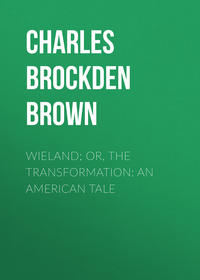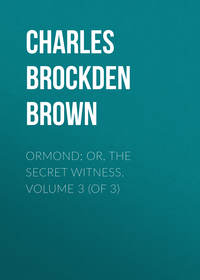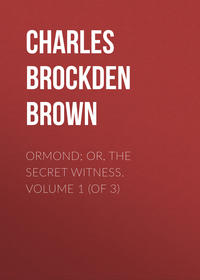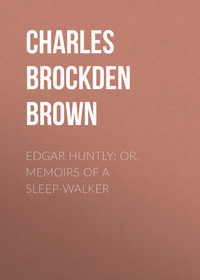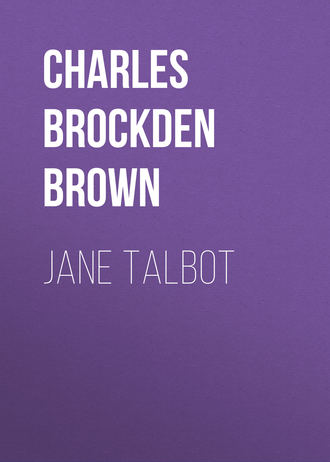 полная версия
полная версияJane Talbot
Perhaps you know the contents of my last letter to him, and of his answer. I know you condemn me. You think me inconsiderate and cruel in writing such a letter; and my heart does not deny the charge. Yet my motives were not utterly ungenerous. I could not bear to reduce the man I loved to poverty. I could not bear that he should incur the violence and curses of his father. I fondly thought myself the only obstacle to reconcilement, and was willing, whatever it cost me, to remove that obstacle.
What will become of me, if my fears should now be realized?–if the means which I used with no other view than to reconcile him to his family should have driven him away from them and from his country forever? I thank my God that I was capable of abandoning him on no selfish or personal account. The maledictions of my own mother; the scorn of the world; the loss of friends, reputation, and fortune, weighed nothing with me. Great as these evils were, I could have cheerfully sustained them for his sake. What I did was in oblivion of self; was from a duteous regard to his genuine and lasting happiness. Alas! I have, perhaps, mistaken the means, and cruel will, I fear, be the penalty of my error.
Tell me, my dear friend, was not Colden reconciled to his father before he went? When does he mean to return? What said he, what thought he, of my conduct? Did he call me ungrateful and capricious? Did he vow never to see or think of me more?
I have regarded the promise that I made to the elder Colden, and to my mother, as sacred. The decease of the latter has, in my own opinion, absolved me from any obligation except that of promoting my own happiness and that of him whom I love. I shall not now reduce him to indigence, and, that consequence being precluded, I cannot doubt of his father's acquiescence.
Ah, dear madam, I should not have been so long patient, had I not, as it now appears, been lulled into a fatal mistake. I could not taste repose till I was, as I thought, certainly informed that he continued to reside in his father's house. This proof of reconciliation, and the silence which, though so near him, he maintained towards me, both before and subsequently to my mother's death, contributed to persuade me that his condition was not unhappy, and especially that either his resentment or his prudence had made him dismiss me from his thoughts.
I have lately, to my utter astonishment, discovered that Colden, immediately after his last letter to me, went upon some distant voyage, whence, though a twelvemonth has since passed, he has not yet returned. Hence the boldness of this address to you, whom I know only by rumour.
You will, I doubt not, easily imagine to yourself my feelings, and will be good enough to answer my inquiries, if you have any compassion for your
J. T.
Letter LIX
To Jane TalbotNew York, October 15.
I HASTEN, my dear madam, to reply to your letter. The part you have assigned me I will most cheerfully perform to the utmost of my power, but very much regret that I have not more agreeable tidings to communicate.
Having said that all the transactions between you and my brother are known to me, I need not apologize for alluding to events, which I could not excuse myself for doing without being encouraged by the frankness and solicitude which your own pen has expressed.
Immediately after the determination of his fate in regard to you, he came to this city. He favoured us with the perusal of your letters. We entirely agreed with him in applauding the motives which influenced your conduct. We had no right to accuse you of precipitation or inconsistency. That heart must indeed be selfish and cold which could not comprehend the horror which must have seized you on hearing of his father's treatment. You acted, in the first tumults of your feelings, as every woman would have acted. That you did not immediately perceive the little prospect there was that a breach of this nature would be repaired, or that Colden would make use of your undesired and unsought-for renunciation as a means of reconcilement with his father, was no subject of surprise or blame. These reflections could not occur to you but in consequence of some intimations from others.
Henry Colden was no indolent or mercenary creature, No one more cordially detested the life of dependence than he. He always thought that his father had discharged all the duties of that relation in nourishing his childhood and giving him a good education. Whatever has been since bestowed, he considered as voluntary and unrequited bounty; has received it with irksomeness and compunction; and, whatever you may think of the horrors of indigence, it was impossible to have placed him in a more painful situation than under his father's roof.
We could not but deeply regret the particular circumstances under which he left his father's house; but the mere leaving it, and the necessity which thence arose of finding employment and subsistence for himself, was not at all to be regretted.
The consequences of your mother's letter to the father produced no resentment in the son. He had refused what he had a right to refuse, and what had been pressed upon the giver rather than sought by him. The mere separation was agreeable to Colden, and the rage that accompanied it was excited by the young man's steadiness in his fidelity to you.
You were not aware that this cause of anger could not be removed by any thing done by you. Golden was not sensible of any fault. There was nothing, therefore, for which he could crave pardon. Blows and revilings had been patiently endured, but he was actuated by no tame or servile spirit. He never would expose himself to new insults. Though always ready to accept apology and grant an oblivion of the past, he never would avow compunction which he did not feel, or confess that he had deserved the treatment which he had received.
All this it was easy to suggest to your reflections, and I endeavoured to persuade him to write a second letter; but he would not. "No," said he, "she has made her election. If no advantage is taken of her tenderness and pity, she will be happy in her new scheme. Shall I subject her to new trials, new mortifications? Can I flatter myself with being able to reward her by my love for the loss of every other comfort? No. Whatever she feels for me, I am not her supreme passion. Her mother is preferred to me. That her present resolution puts out of all doubt. All upbraiding and repining from me would be absurd. What can I say in favour of my attachment to her, which she may not, with equal reason, urge in favour of her attachment to her mother? The happiness of one or other must be forfeited. Shall I not rather offer than demand the sacrifice? And what are my boasts of magnanimity if I do not strive to lessen the difficulties of her choice, and persuade her that, in gratifying her mother, she inflicts no exquisite or lasting misery on me?
"I am not so blind but that I can foresee the effects on my tranquillity of time and variety of object. If I go this voyage, I may hope to acquire resignation much, sooner than by staying at home. To leave these shores is, in every view, best for me. I can do nothing, while here, for my own profit, and every eye I meet humbles and distresses me. At present, I do not wish ever to return; but I suppose the absence and adventures of a couple of years may change my feelings in that respect. My condition, too, by some chance, may be bettered. I may come back, and offer myself to her, without offering poverty and contempt at the same time. Time, or some good fortune, may remove the mother's prejudices. All this is possible; but, if it never takes place, if my condition never improves, I will never return home."
When we urged to him the propriety of apprizing you of his views, not only for your sake, but for his own,–"What need is there? Has she not prohibited all intercourse between us? Have I not written the last letter she will consent to receive? On my own account, I have nothing to hope. I have stated my return as a mere possibility. I do not believe I shall ever return. If I did expect it, I know Jane too well to have any fears of her fidelity. While I am living, or as long as my death is uncertain, her heart will be mine, and she will reserve herself for me."
I know you will excuse me, madam, for being thus particular. I thought it best to state the views of our friend in his own words. From these your judgment will enable you to form the truest conclusions.
The event that has since happened has probably removed the only obstacle to your mutual happiness; nor am I without the hope of seeing him one day return to be made happy by your favour. As several passages were expected to be made between China and Nootka, that desirable event cannot be expected to be very near.
M. M.
Letter LX
To Mrs. MontfordPhiladelphia, October 20.
AH, dear madam! how much has your letter afflicted, how much has it consoled me!
You have then some hope of his return; but, you say, 'twill be a long time first. He has gone where I cannot follow him; to the end of the world; where even a letter cannot find him; into unwholesome climates; through dangerous elements; among savages–
Alas! I have no hope. Among so many perils, it cannot be expected that he should escape. And did he not say that he meant not to return?
Yet one thing consoles me. He left not his curses or reproaches on my head. Kindly, generously, and justly didst thou judge of my fidelity, Henry. While thou livest, and as long as I live, will I cherish thy image.
I am coming to pass the winter in your city. I adopt this scheme merely because it will give me your company. I feel as if you were the only friend I have in the world. Do not think me forward or capricious. I will not deny that you owe your place in my affections chiefly to your relation to the wanderer; but no matter whence my attachment proceeds. I feel that it is strong; merely selfish, perhaps; the child of a distracted fancy; the prop on which a sinking heart relies in its uttermost extremity.
Reflection stings me to the quick, but it does not deny me some consolation. The memory of my mother calls forth tears, but they are not tears of bitterness. To her, at least, I have not been deficient in dutiful observance. I have sacrificed my friend and myself, but it was to her peace. The melancholy of her dying scene will ever be cheered in my remembrance by her gratitude and blessing. Her last words were these:–
"Thou hast done much for me, my child. I begin to fear that I have exacted too much. Your sweetness, your patience, have wrung my heart with compunction.
"I have wronged thee, Jane. I have wronged the absent; I greatly fear, I have. Forgive me. If you ever meet, entreat him to forgive me, and recompense yourself and him for all your mutual sufferings.
"I hope all, though sorrowful, has been for the best. I hope that angelic sweetness which I have witnessed will continue when I am gone. That belief only can make my grave peaceful.
"I leave you affluence and honour at least, I leave you the means of repairing my injury. That is my comfort; but forgive me, Jane. Say, my child, you forgive me for what has passed."
She stretched her hand to me, which I bathed with my tears.–But this subject afflicts me too much.
Give my affectionate compliments to Mr. Montford, and tell me that you wish to see your
JANE.
Letter LXI
To Mrs. TalbotNew York, October 22.
You tell me, my dear Jane, that you are coming to reside in this city; but you have not gratified my impatience by saying how soon. Tell me when you propose to come. Is there not something in which I can be of service to you?–some preparations to be made?
Tell me the day when you expect to arrive among us, that I may wait on you as soon as possible.
I shall embrace my sister with a delight which I cannot express. I will not part with the delightful hope of one day calling you truly such.
Accept the fraternal regards of Mr. Montford.
M.M.
Letter LXII
To Mrs. MontfordBanks of Delaware, September 5.
Be not anxious for me, Mary. I hope to experience very speedy relief from the wholesome airs that perpetually fan this spot. Your apprehensions from the influence of these scenes on my fancy are groundless. They breathe nothing over my soul but delicious melancholy. I have done expecting and repining, you know. Four years have passed since I was here,–since I met your brother under these shades.
I have already visited every spot which has been consecrated by our interviews. I have found the very rail which, as I well remember, we disposed into a bench, at the skirt of a wood bordering a stubble-field. The same pathway through the thicket where I have often walked with him, I now traverse morning and night.
Be not uneasy, I repeat, on my account. My present situation is happier than the rest of the world can afford. I tell you I have done repining. I have done sending forth my views into an earthly futurity. Anxiety, I hope, is now at an end with me.
What do you think I design to do? I assure you it is no new scheme. Ever since my mother's death, I have thought of it at times. It has been my chief consolation. I never mentioned it to you, because I knew you would not approve it. It is this.
To purchase this farm and take up my abode upon it for the rest of my life. I need not become farmer, you know. I can let the ground to some industrious person, upon easy terms. I can add all the furniture and appendages to this mansion, which my convenience requires. Luckily, Sandford has for some time entertained thoughts of parting with it, and I believe he could not find a more favourable purchaser.
You will tell me that the fields are sterile, the barn small, the stable crazy, the woods scanty. These would be powerful objections to a mere tiller of the earth, but they are none to me.
'Tis true, it is washed by a tide-water. The bank is low, and the surrounding country sandy and flat, and you may think I ought rather to prefer the beautiful variety of hill and dale, luxuriant groves and fertile pastures, which abound in other parts of the country. But you know, my friend, the mere arrangement of inanimate objects–wood, grass, and rock–is nothing. It owes its power of bewitching us to the memory, the fancy, and the heart. No spot of earth can possibly teem with as many affecting images as this; for here it was–
But my eyes already overflow. In the midst of these scenes, remembrance is too vivid to allow me thus to descant on them. At a distance I could talk of them without that painful emotion, and now it would be useless repetition. Have I not, more than once, related to you every dialogue, described every interview?
God bless you, dear Mary, and continue to you all your present happiness.
Don't forget to write to me. Perhaps some tidings may reach you–Down, thou flattering hope! thou throbbing heart, peace! He is gone. These eyes will never see him more. Had an angel whispered the fatal news in my wakeful ear, I should not more firmly believe it.
And yet–But I must not heap up disappointments for myself. Would to Heaven there was no room for the least doubt,–that, one way or the other, his destiny was ascertained!
How agreeable is your intelligence that Mr. Cartwright has embarked, after taking cheerful leave of you! It grieves me, my friend, that you do not entirely approve of my conduct towards that man. I never formally attempted to justify myself. 'Twas a subject on which I could not give utterance to my thoughts. How irksome is blame from those we love! there is instantly suspicion that blame is merited. A new process of self-defence is to be gone over, and ten to one but that, after all our efforts, there are some dregs at the bottom of the cup.
I was half willing to found my excuse on the hope of the wanderer's return; but I am too honest to urge a false plea. Besides, I know that certainty, in that respect, would make no difference; and would it not be fostering in him a hope that my mind might be changed in consequence of being truly informed respecting your brother's fate?
I persuade myself that a man of Cartwright's integrity and generosity cannot be made lastingly unhappy by me. I know but of one human being more excellent. Though his sensibility be keen, I trust to his fortitude.
It is true, Mary, what you have heard. Cartwright was my school-fellow. When we grew to an age that made it proper to frequent separate schools, he did not forget me. The schools adjoined each other, and he used to resist all the enticements of prison-base and cricket for the sake of waiting at the door of our school till it broke up, and then accompanying me home.
These little gallant offices made him quite singular among his compeers, and drew on him and on me a good deal of ridicule. But he did not mind it. I thought him, and everybody else thought him, a most amiable and engaging youth, though only twelve or thirteen years old.
'Tis impossible to say what might have happened had he not gone with his mother to Europe; or rather, it is likely, I think, that our fates, had he stayed among us, would in time have been united. But he went away when I was scarcely fourteen. At parting, I remember, we shed a great many tears and exchanged a great many kisses, and promises not to forget. And that promise never was broken by me. He was always dear to my remembrance.
Time has only improved all the graces of the boy. I will not conceal from you, Mary, that nothing but a preoccupied heart has been an obstacle to his wishes. If that impediment had not existed, my reverence for his worth, my gratitude for his tenderness, would have made me comply. I will even go further; I will say to you, though my regard to his happiness will never suffer me to say it to him, that if three years more pass away, and I am fully assured that your brother's absence will be perpetual, and Cartwright's happiness is still in my hands,–that then–I possibly may–But I am sure that, before that time, his hand and his heart will be otherwise disposed of. Most sincerely shall I rejoice at the last event.
All are well here. My friend is as good-natured and affectionate as ever, and sings as delightfully and plays as adroitly. She humours me with all my favourite airs, twice a day. We have no strangers; no impertinents to intermeddle in our conversations and mar our enjoyments.
You know what turn my studies have taken, and what books I have brought with me. 'Tis remarkable what unlooked-for harvests arise from small and insignificant germs. My affections have been the stimulants to my curiosity. What was it induced me to procure maps and charts and explore the course of the voyager over seas and round capes? There was a time when these objects were wholly frivolous and unmeaning in my eyes; but now they gain my whole attention.
When I found that my happiness was embarked with your brother in a tedious and perilous voyage, was it possible to forbear collecting all the information attainable respecting his route, and the incidents likely to attend it? I got maps and charts, and books of voyages, and found a melancholy enjoyment in connecting the incidents and objects which they presented with the destiny of my friend. The pursuit of this chief and most interesting object has brought within view and prompted me to examine a thousand others, on which, without this original inducement, I should never have bestowed a thought.
The map of the world exists in my fancy in a most vivid and accurate manner. Repeated meditation on displays of shoal, sand-bank, and water, has created a sort of attachment to geography for its own sake. I have often reflected on the innumerable links in the chain of my ideas between my first eager examination of the route by sea between New York and Tobago, and yesterday's employment, when I was closely engaged in measuring the marches of Frederick across the mountains of Bohemia.
How freakish and perverse are the rovings of human curiosity! The surprise which Miss Betterton betrayed, when, in answer to her inquiries as to what study and what book I prized the most, you told her that I thought of little else than of the art of moving from shore to shore across the water, and that I pored over Cook's Voyages so much that I had gotten the best part of them by rote, was very natural. She must have been puzzled to conjecture what charms one of my sex could find in the study of maps and voyages. Once I should have been just as much puzzled myself. Adieu.
J. T.
Letter LXIII
To Mrs. TalbotNew York, October 1.
Be not angry with me, dear Jane. Yet I am sure, when you know, my offence, you will feel a great deal of indignation. You cannot be more angry with me than I am with myself. I do not know how to disclose the very rash thing I have done. If you knew my compunction, you would pity me.
Cartwright embarked on the day I mentioned, but remained for some days wind-bound at the Hook. Yesterday he unexpectedly made his appearance in our apartment, at the very moment when I was perusing your last letter. I was really delighted to see him, and the images connected with him, which your letter had just suggested, threw me off my guard. Finding by whom the letter was written, he solicited with the utmost eagerness the sight of it.
Can you forgive me? My heart overflowed with pity for the excellent man. I knew the transport one part of your letter would afford him. I thought that no injury, but rather happiness, would redound to yourself.
I now see that I was guilty of a most culpable breach of confidence in showing him your delicate confession; but I was bewitched, I think.
I can write of nothing else just now. Much as I dread your displeasure, I could not rest till I had acknowledged my fault and craved your pardon. Forgive, I beseech you, your
M. MONTFORD.
Letter LXIV
To Mrs. TalbotNew York, December 12.
I cannot leave this shore without thanking the mistress of my destiny for all her goodness. Yet I should not have ventured thus to address you, had I not seen a letter–Dearest creature, blame not your friend for betraying you. Think it not a rash or injurious confession that you have made.
And is it possible that you have not totally forgotten the sweet scenes of our childhood,–that absence has not degraded me in your opinion,–and that my devotion, if it continue as fervent as now, may look, in a few years, for its reward?
Could you prevail on yourself to hide these generous emotions from me? To suffer me to leave my country in the dreary belief that all former incidents were held in contempt, and that, so far from being high in your esteem, my presence was troublesome, my existence was irksome, to you?
But your motive was beneficent and generous. You were content to be thought unfeeling and ungrateful for the sake of my happiness. I rejoice inexpressibly in that event which has removed the veil from your true sentiments. Nothing but pure felicity to me can flow from it. Nothing but gratitude and honour can redound from it to yourself.
I go; but not with anguish and despondency for my companions. I am buoyed up by the light wings of hope. The prospect of gaining your love is not the only source of my present happiness. If it were, I should be a criminal and selfish being. No. My chief delight is, that happiness is yet in store for you; that, should Heaven have denied you your first hope, there still lives one whose claim to make you happy will not be rejected.
G. CARTWRIGHT.
Letter LXV
To G. CartwrightBanks of Delaware, October 5.
My brother:–
It would avail me nothing to deny the confessions to which you allude. Neither will I conceal from you that I am much grieved at the discovery. Far am I from deeming your good opinion of little value; but in this case I was more anxious to deserve it than possess it.
Little, indeed, did you know me, when you imagined me insensible to your merit and forgetful of the happy days of our childhood,–the recollection of which has a thousand times made my tears flow. I thank Heaven that the evils which I have suffered have had no tendency to deaden my affections, to narrow my heart.
The joy which I felt for your departure was far from being unmixed. The persuasion that my friend and brother was going where he was likely to find that tranquillity of which his stay here would bereave him, but imperfectly soothed the pangs of a long and perhaps an eternal separation.


